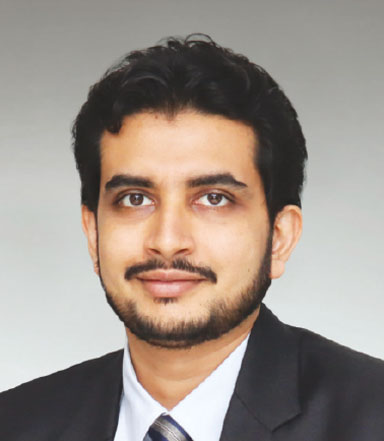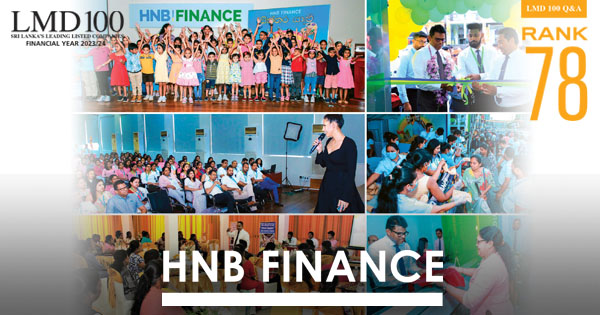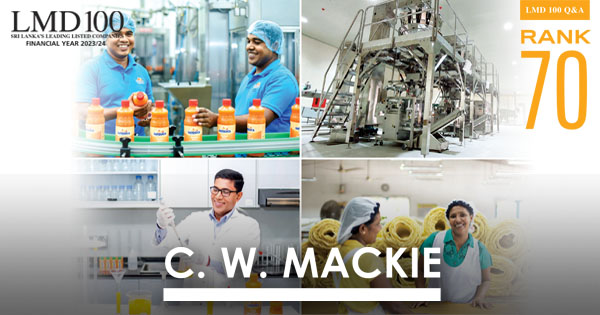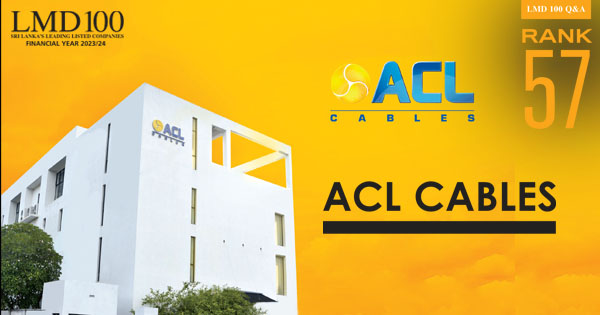LMD 100 Q&A
TEEJAY LANKA

Q: What is your assessment of the textile sector given the multiple crises Sri Lanka faces?
A: As Sri Lanka is struggling with a foreign exchange crisis and parallel exchange rates, the textile sector will be affected too – freight charges requiring dollars is one major challenge.
In 2020, the contribution of the apparel industry to foreign exchange reserves came down to US$ 4.4 billion from US$ 5.6 billion in the previous year.
However in 2021, the industry managed to reach the prior year’s volume, which was impacted by the pandemic and challenges that followed; but we’re still below the pre-pandemic level in terms of revenue.
In my assessment, even though we’re making slow progress in exports, the cost of importing raw materials is considerably higher.
 The other side of the coin is that employees are struggling with the high cost of living, which in turn impacts the cost structure of companies.
The other side of the coin is that employees are struggling with the high cost of living, which in turn impacts the cost structure of companies.
Despite all of this, a high volume of textiles were imported to the country, and the sector has enough opportunities – provided that companies are sufficiently competitive to capitalise on them. The USA-China trade war is one such opportunity – seeking the silver lining in the dark clouds, we’re now focussing on new emerging markets with high potential.
Q: To what extent are innovation and technological change impacting the textile sector?
A: In textiles, innovation is very much needed in terms of product and process innovation.
We have a dedicated team that continues to develop new and innovative products, and maintain the novelty at all stages of the product lifecycle – i.e. through a strong push into research and innovation beyond the traditional mix, and fibre and textile machinery development outside conventional textile value chains.
There are times when innovation is induced by the ideas of retailers – i.e. where retailers’ innovative ideas motivate manufacturers to develop solutions to meet their requirements.
Teejay directly liaises with retailers in terms of raw material development, which gives us the advantage of obtaining market information firsthand. In addition, sustainability has become a requirement of customers in that global buyers favour products made of eco-friendly and ethically sourced materials.
We are also working on operational excellence whereby existing processes are continually improved alongside our digitisation strategy. This will bring in technology to improve production at the operational as well as process level.
Q: Could you shed some light on your expectations for the sector in the post-COVID landscape?
A: The textile sector has been through not one but many hurdles – e.g. the withdrawal of GSP concessions, nearly 30 years of civil war, the Easter Sunday attacks and now the pandemic.
Challenges could immensely change the business trajectory – yet, we need to be mindful and ensure that we navigate the macroeconomic challenges and reach our destination.
As COVID-19 has become part and parcel of the business landscape, markets too have changed in the context of retail strategies with the rapid adoption of technology. That is one of the favourable outcomes of the pandemic, which will shape the post-COVID world.
We’re confident of our strengths; therefore, we were able to start our 20 tonne expansion in India with an investment of US$ 26 million to reach the target of becoming a US$ 300 million business by 2023 despite the challenges posed by COVID-19.
Q: And what’s on the horizon for the Teejay Group?
A: Recognised as the ‘Best Textile Exporter’ in Sri Lanka at the combined 2019-20 and 2020-21 ‘Presidential Export Awards’ ceremony hosted by the Export Development Board (EDB), Teejay will continue to retain its status as the nation’s top knit fabric exporter.
As part of our expansion plan, we’re focussing on catering to customers’ next phase of fabric requirements, with synthetic and niche fabric offerings that are high in quality and value.
In Sri Lanka, we produce only US$ 50 million worth of synthetic fabric and the balance is imported. To capitalise on this potential, Teejay has invested US$ 26 million to increase the Indian plant’s daily output by 20 tonnes to 55 tonnes, which is a huge increase in capacity for the group. This is aligned with our focus on building synthetic fabric manufacturing capacity.
This is a giant leap towards the future of the group as a synthetic fabric manufacturer.
Chief Executive Officer
Chief Financial Officer
Telephone 364 279500 | Email info@teejay.com | Website www.teejay.com







